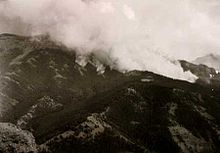| Blackwater Fire of 1937 | |
|---|---|
 Blackwater Fire at approximately 3:45 pm on August 21, 1937 | |
| Date(s) | August 18, 1937 – August 24, 1937 |
| Location | Shoshone National Forest, Park County, Wyoming |
| Coordinates | 44°24′43″N 109°44′29″W / 44.41194°N 109.74139°W |
| Statistics[1] | |
| Burned area | 1,700 acres (7 km2) |
| Impacts | |
| Deaths | 15 |
| Non-fatal injuries | 38 |
| Ignition | |
| Cause | Lightning |
| Map | |
On August 18, 1937, a lightning strike started the Blackwater Fire in Shoshone National Forest, approximately 35 miles (56 km) west of Cody, Wyoming, United States. Fifteen firefighters were killed by the forest fire when a dry weather front caused the winds to suddenly increase and change direction. The fire quickly spread into dense forest, creating spot fires that trapped some of the firefighters in a firestorm. Nine firefighters died during the fire and six more died shortly thereafter from severe burns and respiratory complications. Another 38 firefighters were injured. The fire killed more professional wildland firefighters in the U.S. than any other in the 103 years between the Great Fire of 1910 and the Yarnell Hill Fire in 2013.
The Blackwater Fire consumed 1,700 acres (690 ha) of old-growth forest dominated by Douglas fir trees on the west slopes of Clayton Mountain. At the time the firestorm occurred, the temperatures were about 90 °F (32 °C) and the relative humidity was only 6 percent. Though most of the firefighters consisted of Civilian Conservation Corps (CCC) employees, they were led by more experienced United States Forest Service (USFS) fire managers. Firefighters in the first half of the 20th century used mostly hand tools to suppress wildfires, and all gear was carried by the firefighters or by pack animals. Weather forecasting and radio communication were generally poor or nonexistent.
Investigations and analysis of the event led the USFS to develop better ways to provide a more immediate response to combat fires; one of them was the development of the smokejumper program in 1939. Additionally, the Ten Standard Firefighting Orders, a standardized set of wildland firefighting principles, were developed in 1957. A year after the tragedy, survivors and their fellow employees constructed several memorials at the scene of the incident.
- ^ Kauffman, Erle (November 1937). "Death in Blackwater Canyon" (PDF). American Forests. Archived from the original (PDF) on October 21, 2019. Retrieved July 1, 2013.
